

















“Never, never and never again shall it be that this beautiful land will again experience the oppression of one by another.”
– Nelson Mandela



















“Never, never and never again shall it be that this beautiful land will again experience the oppression of one by another.”
– Nelson Mandela
Since its establishment in 1921, the Faculty of Law has become a significant part of South African society by contributing to the development of the country’s legal system and the protection of human rights. The Faculty is home to three departments, two research chairs, one centre, and the Stellenbosch University Law Clinic.
The HF Oppenheimer Chair in Human Rights, held by Professor Sandra Liebenberg, and the Anton Mostert Chair in Intellectual Property Law, held by Professor Sadulla Karjiker, comprise the Faculty's research chairs that are involved in promoting, upholding, and protecting the various dimensions of human rights, and intellectual property law, respectively. The Centre for Social Justice, headed by Professor Thuli Madonsela, is specifically involved in the advancement of social justice.
Between 2018 and 2022, under the guidance of Professor Theo Broodryk, the Stellenbosch University Law Clinic consulted 6 336 individuals (averaging 1 267 individuals per year), conducted 11 high impact cases (including successful litigation in the Supreme Court of Appeal), reached 2 220 learners through its Financial Literacy Project, presented 13 community-based training sessions (on various topics, including ESTA, wills, constitutional and children’s rights), and produced 23 publications (including publications appearing in 5 accredited journals). The Clinic’s total advertising value amounted to R27.5 million with a total reach of 32.8 million individuals.*




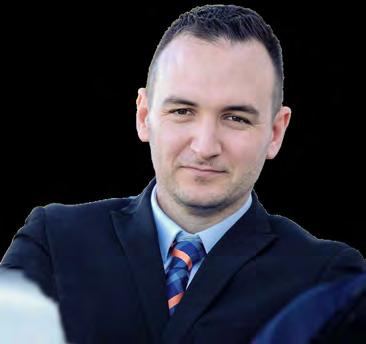
The Chair was endowed by De Beers in 1986 to promote the development of human rights law in South Africa through the three main pillars of academic activities –research, teaching, and social impact activities. Professor Liebenberg is the third incumbent of the Chair. In 2022, the National Research Foundation awarded her the prestigious A1 rating in recognition of her work as a
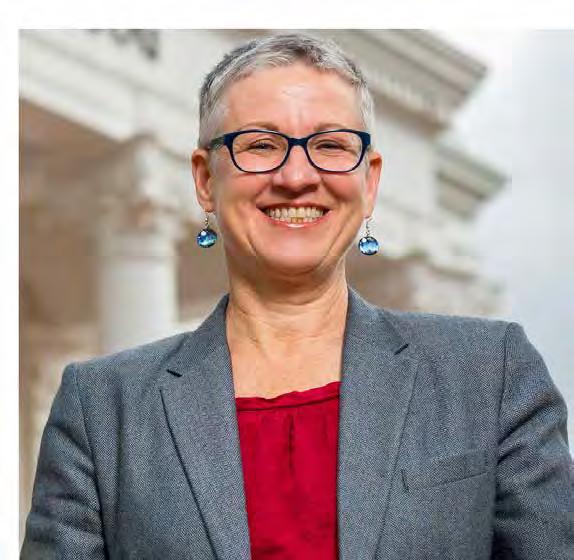
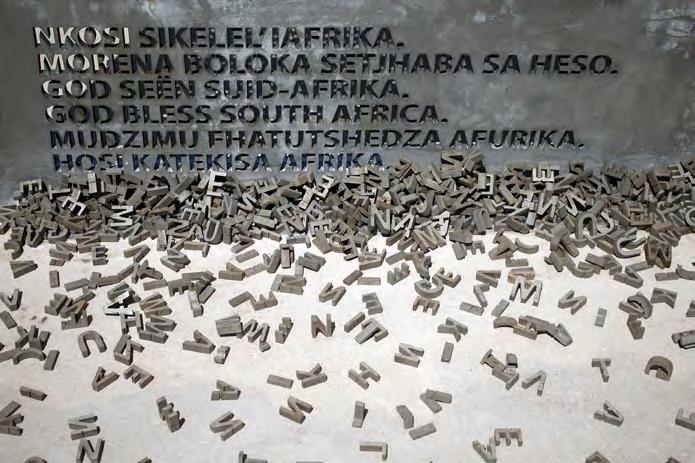
leading international scholar in her field of socio-economic rights. Her research has a significant social impact both within South Africa and globally. She regularly advises and supports non-governmental organisations that focus on the protection of human rights and that seek to use the tools of human rights law to challenge conditions of poverty and inequality. She has also presented her research to the SA Human Rights Commission, the legal profession, as well as various government departments. At the international level, she was elected to the United Nations Committee on Economic, Social, and Cultural Rights (2017 – 2020) and served as Vice-Chair of this body (2019 – 2020). She is currently heading the drafting group of an international research project to develop principles and guidelines to protect the human rights of future generations. Her Chair organises the Law Faculty’s Annual Human Rights lecture series, which is in its 17th year. The 2023 Annual Human Rights Lecture will be delivered on 22 March by Doctor Tlaleng Mofokeng, the UN Special Rapporteur on the Rights to Health. The title of her lecture will be “Who Believes Black Women? Applying the Right to Health Framework to Undo Epistemic Injustice”. Join the lecture online via the following link: https://bit.ly/41EClcE.
 Art Installation in front of the Ou Hoofgebou, Faculty of Law, Stellenbosch University
Art Installation in front of the Ou Hoofgebou, Faculty of Law, Stellenbosch University
PUBLISHED BY Picasso Headline,
A proud division of Arena Holdings (Pty) Ltd, Hill on Empire, 16 Empire Road (cnr Hillside Road), Parktown, Johannesburg, 2193
PO Box 12500, Mill Street, Cape Town, 8010 www.businessmediamags.co.za

EDITORIAL
Editor: Ryland Fisher
Content Manager: Raina Julies rainaj@picasso.co.za
Contributors: Tamsin Jacobs Wort, Vukani Magubane, Reggy Moalusi, Denise Mhlanga, Rod Solomons
Copy Editor: Brenda Bryden
Content Co-ordinator: Vanessa Payne
Digital Editor: Stacey Visser vissers@businessmediamags.co.za
DESIGN
Head of Design: Jayne Macé-Ferguson
Senior Designer: Mfundo Archie Ndzo
Advert Designer: Bulelwa Sotashe
SALES
Project Manager: Jerome van der Merwe
jeromem@picasso.co.za | +27 21 469 2485
+27 820 668 1496
Salespeople: Natasha Hendricks, Frank Simons
PRODUCTION
Production Editor: Shamiela Brenner
Advertising Co-ordinator: Shamiela Brenner
Subscriptions and Distribution: Fatima Dramat, Fatimad@picasso.co.za
MANAGEMENT
Management Accountant: Deidre Musha
Business Manager: Lodewyk van der Walt
General Manager, Magazines: Jocelyne Bayer
In this issue of Human Rights , we look at some of the rights enshrined in our Bill of Rights and ask how far we have come from a society where the majority of people were denied human rights to one where human rights are supposed to become part of our DNA.
One of the most disturbing developments in recent years has been attacks on the judiciary, sometimes not helped by the dubious actions of some in the justice system. We asked an advocate what this means for human rights and our Constitution.
The LGBTQIA+ community has been fi ghting a battle for recognition in our society, despite their rights being guaranteed in the Constitution. The attacks on this community are often violent, and on page 4 activist Tamsin Jacobs Worts argues that many of these cases are relegated to gender-based violence crimes, but should really be seen as hate crimes.
Another contentious right, especially for those whose misdemeanours are exposed, is media freedom. We asked the executive director of the South African National Editors’ Forum, Reggy Moalusi, to unpack the state of media freedom and what the public can do to defend it.

We also explore some other rights, including the right to decent healthcare, the rights of the disabled, and the right to food security, among others.
To set the context, we look at the origins of Human Rights Day in the Sharpeville Massacre on 21 March 1960, and we remember the immortal words of former president Nelson Mandela: “Never and never again”.
Ryland Fisher Editor3 HUMAN RIGHTS DAY
Ryland Fisher explains why commemorating Human Rights Day is important.
4 HATE CRIMES
Victims of violent crime due to prejudice have little faith in the country’s judicial system.
8 JUSTICE South Africa’s judiciary is under pressure and seeing some controversial judgements.
13 MEDIA FREEDOM
COPYRIGHT:
15 FOOD SECURITY
Millions of South Africans are concerned about where their next meal will come from, but organisations focused on feeding the hungry are addressing the issue.

18 PEOPLE WITH DISABILITIES
People living with disabilities are often overlooked when it comes to formal employment, so interventions by supportive organisations are essential for driving access to opportunity.
19 HEALTHCARE
Reggy Moalusi discusses the intimidation of South African journalists and the assault on media freedom.
Nongovernmental organisations and the private sector are stepping in to ensure communities have access to basic healthcare services.

When thousands of people gathered on village squares in Sharpeville, in the then Transvaal province, and Langa township in the then Cape Province, on Monday, 21 March 1960, they did not anticipate that the police would open fire on the unarmed protesters, leaving 69 people dead and 180 injured at Sharpeville, and three people dead and 26 injured at Langa.


Many people were shot in the back as they ran away from the police, and many of the injured were paralysed.
The shootings exemplified a blatant abuse of human rights by the apartheid police who used live ammunition against peaceful protesters. The protests against the hated pass laws, which sparked an international outcry against the apartheid regime, are the genesis for what would become Human Rights Day in post-apartheid South Africa.
For many years after the 1960 protests, led by the Pan Africanist Congress of Azania (PAC) – a breakaway group from the African National Congress – pass laws continued to dominate the lives of black Africans in South Africa. Africans were required to carry a pass to verify their identity, especially if they were stopped in urban areas, until the laws were repealed in 1986.
In each city in South Africa, special pass law courts would process people caught without passes. Many of these people would be fined before being sent back to the apartheid homelands where they were supposed to live, according to the tribal identity bestowed on them by the white authorities.

After 1969, Sharpeville Day was commemorated annually by anti-apartheid forces inside South Africa. It became a huge rallying point for public protests against apartheid.
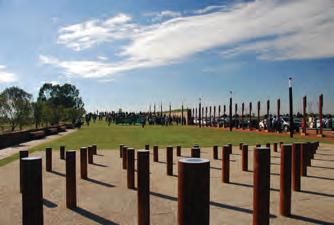


After South Africa became a democracy in 1994, the new government decided to rename Sharpeville Day as Human Rights Day as a way of focusing on all human rights abuses and also of remembering the suffering and sacrifices of thousands of South Africans in the struggle for freedom.
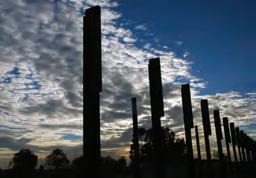
After the different political parties involved in the transition to democracy negotiated a new Constitution for South Africa, President Nelson Mandela signed the final draft of the Constitution into law at Sharpeville on International Human Rights Day, 10 December 1996. This was to convey the message that our new democracy was to be based on human rights and to acknowledge the important influence the Sharpeville massacre had on how the country would be governed.
The Constitution contains a Bill of Rights, which outlines the various rights guaranteed in the Constitution, such as:
• equality;
• human dignity;
• freedom of religion, belief and opinion;
• freedom of expression;
• freedom of movement and residence;
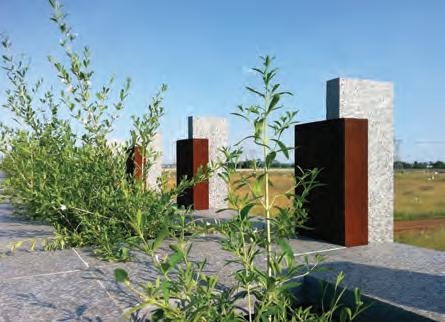
• freedom of trade, occupation and profession;
• healthcare, food, water and social security;
• language and culture;
• access to information; and
• access to courts and speedy justice, among many others.
The introduction to the Bill of Rights reads: “This Bill of Rights is a cornerstone of democracy in South Africa. It enshrines the rights of all people in our country and affirms the democratic values of human dignity, equality and freedom. The state must respect, protect, promote and fulfil the rights in the Bill of Rights.”
At the adoption of the initial Constitution on 8 May 1996, Mandela said: “The new Constitution obliges us to strive to improve the quality of life of the people. In this sense, our national consensus recognises that there is nothing else that can justify the existence of government but to redress the centuries of unspeakable privations, by striving to eliminate poverty, illiteracy, homelessness and disease. It obliges us, too, to promote the development of independent civil society structures.”
He added: “This Constitution is our own humble contribution to democracy and the culture of human rights worldwide, and it is our pledge to humanity that nothing will steer us from this cause.”
South Africa’s Constitution has withstood many challenges in recent years and has served as a constant barometer of the kind of society we all deserve. It has also inspired many internationally with its progressiveness and forward-thinking clauses.
Sixty-three years after the events at Sharpeville and Langa, it is important to commemorate Human Rights Day to remember what happened years ago and how it has impacted the rights we enjoy today. Let us remember these words from Mandela’s inauguration speech: “Never, never and never again shall it be that this beautiful land will again experience the oppression of one by another and suffer the indignity of being the skunk of the world.”
It is important to commemorate Human Rights Day to remember what happened years ago and how it has impacted the rights we enjoy today.
Ryland Fishe R unpacks why commemorating Human Rights Day is so important
“The new Constitution obliges us to strive to improve the quality of life of the people.” – Nelson Mandela
How incredible would it be if the president committed state officials and state resources to ensure an end to the discrimination and violence against lesbian women and the greater LGBTQIA+ community in South Africa?
South Africa has a Hate Crimes Bill that is 11 years old but still hasn’t been passed. What is preventing policy-makers from passing this bill if it’s designed to protect us?
How heartfelt are condolences when a human being is dead and a family has to beg for justice?
Where can lesbian women go if police stations are not safe?
I’ve just come across another harrowing story about a lesbian woman being killed, the accused walking free, and the case being regarded solely as gender-based violence (GBV) when, in fact, this was also a hate crime. I am angry.
While GBV does refer to harmful acts directed at an individual based on their gender, it is rooted in gender inequality, the abuse of power and harmful (often patriarchal) “norms”, hate crimes are typically those involving violence that are motivated by prejudice based on ethnicity, religion or sexual orientation.


In 2022, 27 hate crimes took place against the LGBTQIA+ community alone – these are cases that were actually documented. Many of them were violent and brutal acts, some as horrific as “corrective” rape and murder.
More of these violations can be recorded, but there is an enormous gap between LGBTQIA+ persons and their faith in South Africa’s criminal justice system. Many lesbian women won’t report these violations because they fear being
undermined, ridiculed or stigmatised by the police – or court.
And there’s a chance they may face secondary violations. Secondary violations – or victimisation – are behaviours and attitudes by police, the court, or members of authority that victim-blame. It also refers to behaviours that leave victims feeling violated and raped again or damage victims’ psychological wellbeing.
Most hate crime cases in the LGBTQIA+ community go undetected. This is also because witnesses are reluctant to come forward.
Despite living in the first African country to legalise same-sex marriage (back in 2006) and a Constitution that guards against discrimination based on sexual orientation, many members of the LGBTQIA+ community will tell you they fear for their lives every single day.
Every time a woman is killed, policy-makers call it gender-based violence and scream for action and putting the right measures in place, and demand high levels of investigation, but as soon as it’s a hate crime – a violation of a human right to live and breathe because their identity isn’t considered a “societal” or “social” norm – there doesn’t seem to be enough information to prosecute or document these cases transparently. Why?
My question is this: how are we to bask as we exist at the same time as this lovely Constitution that is “free” and “fair” when the people who violate, rape, mutilate and murder lesbian women walk free?
How lesbian women are portrayed needs to change.
In the past, President Cyril Ramaphosa has addressed issues around GBV, femicide, hate crimes and human rights violations taking place in South Africa, particularly brutal attacks on LGBTQIA+ persons. While these efforts are noted, perhaps government needs to lead society on a way forward to directly address the issues facing the LGBTQIA+ community.
How incredible would it be if the president committed state officials and state resources to ensure an end to the discrimination and violence against lesbian women and the greater LGBTQIA+ community in South Africa?
There is an enormous gap between LGBTQIA+ persons and their faith in South Africa’s criminal justice system. Many lesbian women won’t report these violations because they fear being undermined, ridiculed or stigmatised.
Justice continues to fail the victims of gender inequality and the violence inflicted due to prejudice, writes activist TAMSIN JACOBS WORTTamsin Jacobs Wort

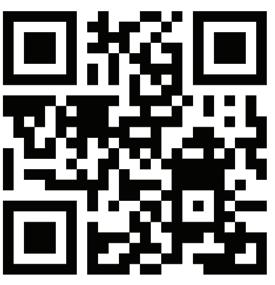
The Bookery is a nonprofit organisation that creates school libraries. Established in 2010 as part of the Equal Education campaign for school libraries, the organisation became independent in 2013. The Bookery has created 91 libraries across three provinces: the Western Cape, Eastern Cape, and Gauteng. We have distributed more than 360 000 books, reached over 94 000 learners and trained and employed over 75 library assistants.
School libraries are an essential part of the education experience, particularly for learners from disadvantaged communities, as they give every child the opportunity to read and learn. Libraries play a crucial role in supporting school curricula and teaching, helping learners to pursue learning beyond the classroom. Libraries offer a safe and supportive environment for promoting curiosity in learners and exposing them to a new world of ideas.


The Bookery’s vision is to create dynamic school libraries that inspire a love of reading, break barriers, and change lives. The first step is the Library Creation Programme. The organisation engages with prospective schools to develop a sustainability plan for the library and the collection of resources to set it up. We do not build school infrastructure, but use the
spaces available at the schools. We repurpose the space by adding flooring, bookshelves, furniture, computers, printers, and books. We aim to provide learners with books that reflect their lives, cultures, and languages. Relating to stories is an essential element in developing a love of reading and learning. Diversity of culture and language is a defining feature of South Africa – an important part of The Bookery’s work is to provide spaces for multilingual reading and learning. Learners are encouraged to read books and engage with materials in their mother tongue.
After the Library Creation Programme, we continue our involvement through our Literacy Support Programme, which includes employment and training of unemployed youths as library assistants. They are the heart of the libraries. They help guide, encourage, and cultivate a love of books and reading in learners. The Bookery provides skills development training for them to conduct literacy activities in the libraries. The content and activities are complementary and supplementary to the school syllabus.
Reading for leisure is pivotal to a learner’s education. According to the 2016 Progress in International Reading Literacy Study, 78 per cent of South African Grade 4 learners cannot read at an appropriate level. This is unsurprising, given that 74 per cent of schools in South Africa do not have libraries on their premises. And of the 26 per cent of schools that have libraries, only 8 per cent are functional.

Reading and literacy skills are critical in promoting not only education, but also future employment, and ultimately

improving the quality of life for learners and their communities. A key element of this is increasing equality through access to educational resources, this is where the organisation has an important role to play.
“Children must have access to books, and many children can’t go to a store and buy a book. We need our public libraries to be funded and staffed properly as well as our school libraries. Many children can’t get to a public library, and the only library they have is a school library,” says Katherine Paterson, an American children’s book author, speaking about the importance of libraries.
The Bookery aims to set up at least 20 new school libraries stocked with age-appropriate multilingual fiction and nonfiction books and staffed with library assistants within the next three years. We cannot achieve this goal without your support. Together we can create a country of educated, informed, active citizens.
Reading and literacy skills are critical in promoting not only education, but also future employment, and ultimately improving the quality of life for learners and their communities.
The Bookery sets up school libraries, trains library assistants and supplies books to promote literacy among children.
By
LWAMBESO LUNGA NQADOLO, managing director, The Bookery
Bestselling author and economist Noreena Hertz once said: “We live increasingly in a world of haves and have-nots, of gated communities next to ghettos, of extreme poverty and unbelievable riches. Some enjoy rights that are completely denied to others. Relative inequalities are exploding, and the world’s poorest, despite all the advances of globalisation, may even be getting poorer.”
This year marks the eve of South Africa’s 30 years of democracy. It is indeed a milestone, one that begs reflection on how far we have come in realising the hopes that the dawn of this democracy promised to the majority of black people.
The first elections held with universal suffrage in April 1994 did not only entrench the human dignity of the majority of black people in the country, but also promised an even playing field when it comes to the equal protection and benefit of rights, access to resources and opportunities. Things were supposed to change for the better for the majority of people.
The Bill of Rights in Chapter 2 of the South African Constitution, which enshrines civil and political rights, and economic, social and cultural rights, codified these promises, etching them in the supreme law of the land, thus turning promises into rights that the state must respect, protect, promote and fulfil.
For the most part, South Africa has done a lot in policy and action towards making rights real for the majority of South Africans. From civil and political rights to economic, social and cultural rights, as well as environmental rights, strides have been made.
The Constitutional Court has produced some of the best landmark decisions challenging the constitutionality of certain inequality provisions of laws and practices, which are inconsistent with the provisions in the Bill of Rights. New laws have been promulgated, and others amended to address the unequal realities and historical disadvantage that black people and women,
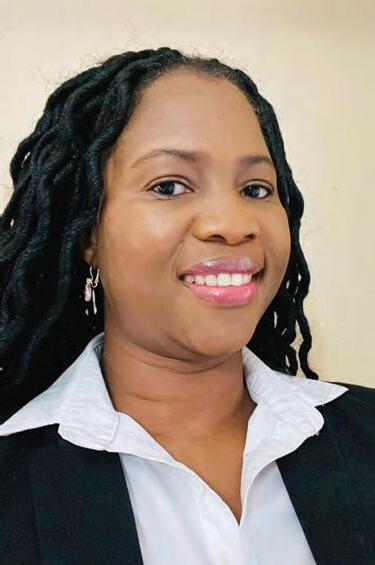
in particular, have experienced as a result of South Africa’s brutal past. From a legislative, programmes and action plans perspective, much has been done, and continues to be done, to transform the realities and experiences of black people.
However, 29 years later, law and reality remain poles apart, at least for an ordinary person on the street, and the divide keeps widening between what exists and requires implementation on the letter of the law and what has actually been done on the ground when it comes to bridging the inequality gap.
In South Africa, you do not have to go far to see inequality and experience it. Whether a tourist or resident, all it takes is a drive through the city to see opulence on one side of the
road and poverty on the other, starkly coexisting, displaying the two realities. Sandton and Alexandra are a road apart, Fourways and Diepsloot are alongside each other. The 2022 State of South African Cities Network report highlights that one in five people in the country’s biggest cities – including Johannesburg and Cape Town – live in informal housing. This is a staggering figure and an indictment of government’s responsibility to provide housing as a right to its citizens.
Service delivery is one of the true markers of inequality in South Africa. For the haves, service delivery is prompt, well-equipped and available. For the have-nots, service delivery is not only inadequate, but also slow and, most times, unavailable.
At the Centre for the Study of Violence and Reconciliation, we study violence, particularly, its root causes, key drivers, fuelers and triggers. One root cause of violence that keeps coming up in our numerous research reports is inequality that is structural and systemic in the South African context. When you tell people that the government has no budget or resources to deliver services such as sanitation, sewerage, proper housing, infrastructure, water and electricity when they have been waiting patiently for 29 years for this change to come, frustrations are bound to surface. The mass frustrations get compounded when all it takes is someone who has waited for so long for this promised change to look across to the other side of the road to see for themselves that “it is not that these services are unavailable, they are just not available, for me or people like me”.
The psychology of violence brought about by inequality is not that hard to understand. From a rights perspective, everyone has a right to housing, sanitation, infrastructure, sewerage, food, social security, healthcare, and many other socioeconomic rights whose realisation dignifies one’s existence in society. However, these rights are only the preserve of a few – the elite and the privileged. The rights
In South Africa, you do not have to go far to see inequality and experience it.
Annah Moyo

Established in South Africa in 1989, the Centre for the Study of Violence and Reconciliation (CSVR) is a multidisciplinary institute that seeks to understand and prevent violence, heal its effects and build sustainable peace. Through research, advocacy, and mental health and psychosocial support work in collaboration with communities affected by violence, CSVR seeks to enhance state accountability, promote gender equality and build social cohesion, integration and active citizenship.


For 33 years, the centre has been working to address gross human rights violations in South Africa, the African continent and globally. CSVR’s research seeks to understand the root causes and key drivers of violence, and the findings inform interventions. CSVR’s interventions include mental health and psychosocial support services to victims of gross human rights violations, using trauma-informed approaches to healing, and building the resilience of those most affected by violence. Its advocacy work informs the design and development of policies that address the contextual realities of those most affected by violence and violations. CSVR shapes public discourse through its work to improve practice and future interventions.
and the services are available and can be seen on the other side of the divide, just not where they are needed the most.

Violent service delivery protests within this psychology and reasoning are therefore not mere criminality, but an outlet of frustration, anger and impatience of what was promised yet is still out of reach by virtue of location, class and privilege. A recent article in the Mail
& Guardian on service delivery protests reveals that in 2022 alone, at least 193 service delivery protests occurred in the country – this equates to one service delivery protest every 1.9 days.
If rights are to be realised for everyone in South Africa, communities and the lives of ordinary people on the street should be the site of this reality. Dismantling structural inequality will require us to return to the right approach for addressing it. Citizens and community members are not asking for handouts, they are not asking for benevolence; these are their rights and we, as government, human rights organisations and the private sector, are accountable. We are lagging in actualising their rights, and they are rightly impatient and frustrated. When they protest, they are exercising their rights, and we have a duty to meet with them and give them answers.

Scan this QR code to go directly to the CSVR website.

For more information:

(27) 11 403 5650

info@csvr.org.za
www.csvr.org.za
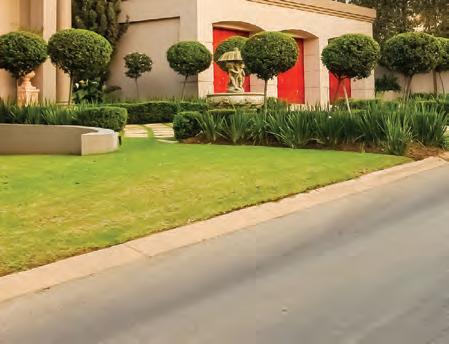
Service delivery is one of the true markers of inequality in South Africa.

South Africa’s judiciary has been under pressure recently, raising fears that future judgements may be undermined. How strong is our justice system, and what is the reason for some of the seemingly controversial decisions taken recently? asks Advocate ROD SOLOMONS, convener of the South Africa 1st Forum

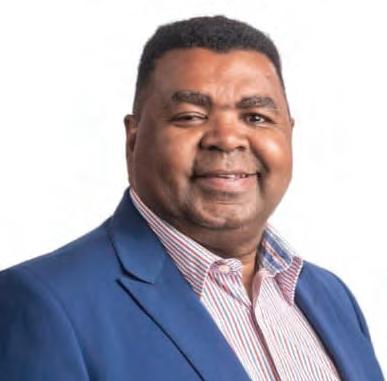

The right to justice is sacrosanct and enshrined in South Africa’s Constitution. The South African judiciary was already under pressure before and during the apartheid years, with various governments and dominant political parties wanting judgements favouring the dominant political order. In most instances, the judiciary withstood such pressures, with some judges passing judgements against the prevailing political order. These judges were guided by their sense of justice and interpretation of the law in a “humane” way. Many of them were overlooked for higher office.

In democratic South Africa, our courts have decisively chosen to be in the corner of those whose human rights, as enshrined in our Constitution, have been infringed. Our courts have, in the main, also decisively pronounced against those who abuse their authority, are corrupt and wish to be unaccountable in exercising their oath of office. Our judiciary can be so bold because of the constitutional and governance architecture laid by those who were responsible for setting us on our way in 1994. The extremely sad thing though is that many whose rights have been infringed and whose last hope is to go to court to get justice cannot afford to do so. If it were not for some NGOs and even some political parties, many matters concerning human rights infringements, corrupt practices, unaccountable decision-making or leadership lapses would not end up in court to be aired properly and justice dispensed.
been infringed.






Currently, we increasingly have the unedifying spectacles where our courts are disrespected, with politicians and even some legal practitioners being disrespectful to officers of the court and even launching attacks against some judgements or against judges, prosecutors or magistrates.






















Some high-profile examples include Advocate Dali Mpofu SC’s remarks of disdain towards some of his legal colleagues opposing him in matters, the role of the legal team of former president Jacob Zuma under the leadership of Advocate Sikhosane SC in the former’s disrespectful walking out of the proceedings of the Zondo Commission, the disparaging remarks cabinet minister Lindiwe Sisulu, made about the judiciary, the derogatory remarks the leader of a political party and member of parliament, Julius Malema, made against a magistrate and prosecutor in a case where he is an accused, and the miscreant behaviour of Advocate Malesela Teffo.
These and other actions set an unhealthy example to ordinary South Africans, and if it takes root, we are on a total slippery slope downwards.
Our courts have decisively chosen to be in the corner of those whose human rights, as enshrined in our Constitution, haveAdvocate Rod Solomons
Luckily, many in civil society and some within the legal fraternity have spoken out against this. The South Africa 1st Forum, for example, has taken the unprecedented step of reporting such matters to bodies such as the Legal Practices Council for further investigation and sanction where appropriate. Until today we still have not received finality on some of our complaints.

We also have allegations of improper behaviour swirling around members of the judiciary. There is, for example, the long-running saga concerning Judge President John Hlophe of the Western Cape High Court and some other judges in that court. This saga gives more ammunition to those who want to disrespect our judiciary. Our country is being done a disservice with the inordinate amount of time it took to investigate and deal with this matter.
We must thank our first democratic president, Nelson Mandela, for setting the perfect example in dealing with the judiciary. He took accountability for a government decision and did not try and wriggle out of it. He respected the process by appearing in person when Louis Luyt took him to court. He respectfully accepted the judgement and the judiciary, and our country was the better for it.
While the Zondo Commission dealt with several key issues, it would have done us a huge service in delving much deeper into a piece of explosive information revealed during its hearings: the State Security Agency project called “Project Justice”. We would have then known if there is any truth to the serious and disturbing rumours/allegations about the “capturing of our judiciary”, with judges on the take.
We need to be crystal clear and confident that none of our judges or magistrates are on the take. If I were the president, I would institute an inquiry into that allegation because as long as it is whispered about at parties or braais or behind doors, our judiciary will be subjected continually to attacks and suspicions of being on the take or doing the bidding of certain individuals or interest groups.
The best way for the judiciary to be protected is:
• For members of the judiciary/magistracy to act beyond reproach and not be scared to take legally sound, but unpopular (to the political establishment) decisions.
• Society needs to remain vigilant and take to task those who are disparaging towards the judiciary
• The JSC and professional bodies such as the Bar Councils and Legal Practices Council need to be more speedy and decisive in investigating and acting on complaints lodged against members of the judiciary and legal practitioners.
• The media obviously needs to report on these matters without fear or favour
The civil society group, the #sa1stforum, was established in 2016 to empower ordinary South Africans to get their voices back in order to push back against an unaccountable government leadership that thought it could freely loot the country. We demanded that there be accountability with consequences, and political leaders had to put our country, its people and our Constitution first. It was our judiciary that stepped up to the plate to let those in authority know that they don’t have unfettered powers. And, it is that judiciary that all South Africans must jealously guard and protect because, without a fearless and uncaptured judiciary, South Africa will truly become a failed state.
We need to be crystal clear and confident that none of our judges or magistrates are on the take.
Cliffe Dekker Hofmeyr has a committed team of legal experts working to ensure the protection of human rights, writes JACQUIE CASSETTE , director and practice head, together with director BRIGITTA MANGALE , and senior associates, ELGENE ROOS and GIFT XABA , Pro Bono & Human Rights Practice


As one of South Africa’s leading law firms, Cliffe Dekker Hofmeyr appreciates the impact it can make in promoting access to justice and protecting basic human rights. Deploying skilled resources to the enforcement and protection of human rights is an all-year-round task, not just a focus in March each year.
Our small yet dedicated Pro Bono & Human Rights Practice specialises in impact litigation that cuts across several areas of law and public interest, with the potential to impact many individuals and communities by upholding, developing and protecting their basic human rights. This article highlights four of the many such matters run by the Pro Bono & Human Rights Practice.

We represent Section27 in an important case aimed at bringing Gauteng Provincial healthcare legislation and policy in line with the tenets of the South African Constitution. Pregnant and lactating migrant women and children are continually denied the free access to healthcare services that we argue they are entitled to. This denial stems, in part, from the country’s enduring xenophobic climate and a confusing myriad of subordinate legislation and policy that is not in line with our Constitution or the National Health Act of 2003.
Section 4(3) of the National Health Act and section 27 of the Constitution govern access to healthcare in South Africa. Section 27 entrenches the right to healthcare, and section 4(3) provides that all pregnant and lactating women and children under the age of six are entitled to free healthcare, provided they are not a member or dependent of medical aid.
However, despite these provisions, subordinate legislation and policies in Gauteng do not align with them and contribute to migrants, in particular, facing life-threatening challenges when attempting to access healthcare institutions. Current provincial policy is also being interpreted in a manner that requires all foreign national patients to make an upfront payment before being able to access any medical care, regardless of whether a foreign national patient forms part of a category of persons entitled to free health services.
We seek an order declaring the relevant legislation, regulations, and policies unlawful to the extent they do not comply with section 4(3) of the National Health Act and the Constitution. Our aim is to challenge medical xenophobia and promote substantive equality for all.


Unlawfully requiring migrant pregnant women to pay for healthcare services contrary to section 4(3) of the National Health Act is also detrimentally impacting the fundamental rights of their newborn babies. Seemingly to coerce
affected women into making payment, several public healthcare institutions are refusing, we believe unlawfully, to issue proof of birth notices to certain migrant mothers until they pay the often-large amounts hospitals are charging for delivery. This affects their ability to register the births of their newborns because proof of birth notices are required to facilitate birth registration under the Birth and Registration Act of 1992. Without them, parents cannot register the birth of their child. We are assisting a shelter that is a place of refuge for migrants and displaced women and children to challenge this practice. Birth registration is a fundamental right for all and key to the realisation of the right of every child to a name and nationality from birth under section 28 of our Constitution. The practice has far-reaching consequences for the impacted children, who will be left undocumented. Being undocumented threatens to render them stateless and unable to access basic human rights. Withholding proof of birth, therefore, not
only violates the right of a pregnant woman to access free healthcare, but also violates the rights of the child.
PROMOTING EFFECTIVE REMEDIES FOR VIOLATIONS OF SOCIOECONOMIC RIGHTS



In the recent proceedings before the High Court, the families sought a contempt order against the authorities, alternatively, an award of constitutional damages, given the municipality’s long-standing breach of a court order requiring them to provide the housing they had been granted officially in the late 1990s.

ESCR-Net made detailed representations on international and comparative legal standards and jurisprudence concerning the enforcement of economic, social and cultural rights through effective remedies, including contempt orders, damages and supervisory orders. The submissions emphasised that international law requires an effective remedy – one that provides restitution, compensation, rehabilitation, satisfaction and guarantees of nonrepetition.
The case provided the Court with a unique opportunity to develop jurisprudence
consistent with our international law obligation to develop effective remedies for all human rights. As detailed in ESCR-Net’s submissions, judicial enforcement through contempt orders, supervisory orders and damages awards, or a combination of these remedies, are among the range of effective remedies that have been applied by international treaty bodies, regional courts, and domestic courts across the world. Judgement was reserved and is expected soon. We look forward to receiving the outcome of this important case.
ASSISTING A TRANSGENDER WOMAN TO HOLD THE MINISTER OF POLICE ACCOUNTABLE

The plaintiff launched a damages claim against the Minister of Police at the end of 2019. The minister gave notice of his intention to defend

the case in 2020 and since then has taken no further steps to defend the matter. After years of trying to engage the minister to take further steps in the matter, first by Lawyers for Human Rights and now by our Practice to whom the matter was referred, the minister has now belatedly applied for condonation to do so and seeks leave to deliver his plea, which is three years overdue. The state has a heightened obligation to conduct itself responsibly and ethically in litigation, and the minister’s failure to adhere to the rules of court and to respect the plaintiff’s right to access justice constitutes a palpable breach of this responsibility. The minister’s application seeking leave to deliver his grossly belated plea – which the plaintiff strongly opposed –was heard in February 2023, and we await judgement. The outcome of this application will be an important message for transgender persons as to how the minister and our courts view the protection of this vulnerable group. We remain hopeful for a just outcome.
Gift Xaba
Scan


There are often comments along the lines of how South African journalists are fortunate that they don’t get killed or unreasonably imprisoned in comparison to other parts of our continent or the world. However, we must remember that numerous journalists still face a barrage of abuse and threats for simply doing their jobs.
These threats, mostly delivered online, are often by faceless losers with nothing in mind but to cast aspersions on journalists’ work. They use intimidation as a form of subjugation into silence. However, journalists rarely keep quiet. Yet, we still see a concerted persistence of this abuse and a prevalent lack of action by the social media companies where these trolls live, particularly Twitter.
In typical misogyny, women journalists face the worst. They are called names, taunted, bullied, and threatened with the worst of crimes such as rape. Yet, we still have more followers of these trolls encouraging them to do more.
Further, beyond faceless online bullies, there are sectors of our society that still see
nothing untoward with intimidating journalists and doing their utmost to stop them from covering or exposing their nefarious ways. It has become a norm for some that journalists should be treated as irritating ants to be crushed at any given opportunity. While condemnation has proven inadequate, meaningful steps by organisations such as the SA Human Rights Commission should be the order of the day. Unfortunately, we have seen little action or the desire to prosecute from our criminal justice system.
Media freedom does get trampled when we see how courts can be abused by those seeking to take journalists to court, for simply doing their work. While such will always be challenged, we must guard against the
setting of precedence that will set us back against the very same ideals we aspire to achieve when it comes to media freedom.
The government, particularly through its Government Communication and Information System (GCIS), often speaks out in support of media freedom. But these are mere statements who fail to offer any policy or legislative solutions on proposed, concomitant action against those that continue to threaten journalists.
The GCIS, and the minister responsible for it, Ministry in the Presidency, can do better in continuous education of the greater South African public about the importance of respecting media freedom, and the acknowledgement of the critical work done by journalists, a responsibility that cannot be upheld solely by the South African National Editors’ Forum (SANEF).
Take, for instance, a service delivery protest. There will be those leading the pack when a protest is organised, yet we still see a failure from these leaders to take up the cudgel of discouraging their communities from attacking journalists. They fail to impart any knowledge of why they are there and why it’s pivotal to cover their story. Communities still look away when journalists are robbed of their equipment or their premises vandalised by criminals known to the same communities.
While SANEF has a defined role of upholding media freedom, help is still needed across our communities when it comes to educating the man on the street about the ideals of media freedom and what it means for our constitutional democracy.
As we near World Press Freedom Day on 3 May, SANEF will do so as one of the many African organisations gathered in Zambia at the second media convention. Issues such as the right of the media to do their work across the continent will be discussed. Attending organisations will continue to call on the likes of the Rwandan authorities to expedite their investigations into the mysterious death of John Williams Ntwali. Ntwali was a leading investigative journalist whose death in early January has left more questions than answers.
Here in South Africa, we, as SANEF, will continue to encourage investigative journalism and cajole other journalists to work without fear or favour. We will also continue to appreciate the enshrined constitutional right of media freedom and drive our journalists to work even harder in memory of Ntwali and other journalists whose deaths should not be in vain.


While Sanef has a defined role of upholding media freedom, help is still needed across our communities when it comes to educating the man on the street about the ideals of media freedom and what it means for our constitutional democracy.Reggy Moalusi, executive director of SANEF,
discusses South Africa’s media freedom challenges and the role its citizenry can play to uphold this constitutional rightReggy Moalusi

The United Nations’ Food and Agriculture Organisation defines food insecurity as “being uncertain about where your next meal is coming from”. In South Africa, that uncertainty is a daily reality for millions of citizens in rural, peri-urban and urban centres across all nine provinces.
The right to food – a human right set out in the South African Constitution (section 27(1)(b) – continues to elude a large majority of citizens trapped in the vicious cycle of poverty, unemployment and inequality.
According to Stats SA, during the COVID-19 pandemic, one out of five South Africans experienced moderate to severe food insecurity in September 2020, while almost 14.9 per cent experienced severe food insecurity.

For community activist Joanie Fredericks, those stats are not just numbers, but real people in her community who queue for meals twice daily at one of the eight kitchens she runs in Tafelsig, a neighbourhood she describes as “the worst of the worst of Mitchell’s Plain”.
Fredericks started Tafelsig Mitchell’s Plain CAN in 2020 during the lockdown and pivoted to food security to address what she regarded as government’s inability or appetite to address a crisis. Through partnerships and community support, she has continued to feed those in need.
“COVID-19 led to so much daily destruction. We are seeing the after-effects. People who were supporting others now need the support. People are still sick. Businesses have shut down permanently, leaving many jobless. The queues to get food are not getting any shorter,” she says.
“The biggest challenge is the loss of people’s dignity because hunger is dehumanising. People need to feel empowered. Food is good, but food alone will not solve the problem,” Fredericks says.
In South Africa, as millions go hungry, more than 10 million tons of food is lost, destroyed or wasted annually, says Andy du Plessis, MD of FoodForward SA (FFSA), a public-private partnership that aims to address food waste and hunger by redirecting surplus edible food that would otherwise go to waste to those who need it most.
Du Plessis says the biggest challenge is to reduce the loss and wastage of good edible food across the supply chain to scale up so “we can help more people”. He says 30 million people experience moderate to severe food insecurity regularly on a monthly basis.
A big obstacle to these efforts is the lack of a food donations policy to govern food donations. FFSA is currently driving a petition calling on government to amend the Food Act to include policies regarding food safety for food donations and the creation of a policy framework for liability protection for food donors and food redistribution. The petition is also calling on government to provide tax incentives for food donors and government grants for food redistribution organisations addressing food insecurity at a large scale.
“People do not realise how stark the situation is, but it is not hopeless. Food insecurity and hunger need political will to help access safe and healthy food,” du Plessis says.

A key player in the food ecosystem is the OneFarm Share platform. It partners with farmers with surplus produce to reduce waste, mitigate climate effect and fight hunger. The platform is building an ecosystem of people wanting to optimise food security, says CEO Grant Jacobs.
The platform has direct access to farmers and partners with Agri SA and its 16 000 members to spread the word to farmers. “We educate them on food waste and what to do about it,” he says.
“We collect the produce through food distribution partnerships with FFSA, Gift of the Givers and SA Harvest. We know where the surplus produce is and where it is needed, and we connect the dots of the ecosystem for all of these players,” he explains.
entrepreneur and social activist angela Yeung started the impilo foundation in 2020 after an urgent call to collect food for House of Paradise, a shelter in katlehong for women and children who are victims of gender-based violence (gbV) and food insecurity.
Yeung hopes to summit Mount everest in april to raise funds for a skills centre in the shelter and highlight other gbV programmes. Supporting victims of gbV not only provides safety for women, but also helps them provide food for their families.
Source: www.impilofoundation.co.za
Increasing numbers of people are suffering from food insecurity, and much more needs to be done, writes Vukani Magubane
“Food insecurity and hunger need political will to help access safe and healthy food.” – Andy du Plessis
Coca-Cola Beverages South Africa is helping build smarter, more resilient and sustainable communities, writes VELAPHI
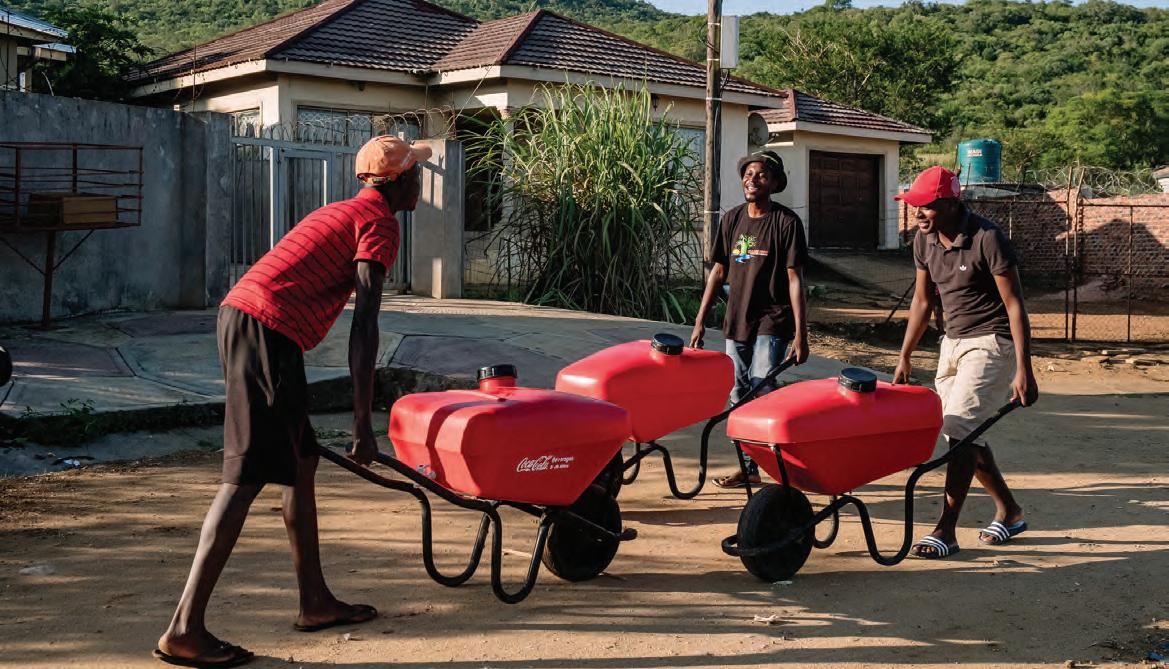 RATSHEFOLA , CCBSA managing director
RATSHEFOLA , CCBSA managing director
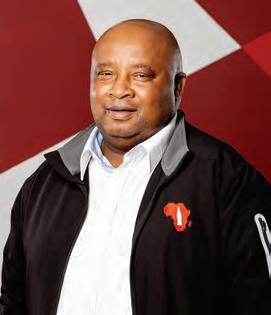
If South Africa is to avert a national Day Zero water crisis, it must adopt an integrated approach now rather than later to secure and protect this scarce resource for future generations. Access to safe water, sanitation and hygiene is not just a resource issue, it is a human rights issue. It is the most basic human need to ensure health and wellbeing. A United Nations report states that access to water and sanitation is recognised as a human right and fundamental to everyone’s health, dignity and prosperity. However, billions of people still live without safely managed water and sanitation. Therefore, the United Nations’ Sustainable Development Goal 6 spells out the importance of water and provides direction for countries to ensure access to water and sanitation for all.
The private sector together with government and local communities must take an integrated and focused human rights-based approach to water and sanitation improvements.
In South Africa, a country and society still under development, the provision of or access to clean and safe water must be considered a priority for all. Human Rights Day is celebrated on 21 March, and serves as a reminder to all of us that access to basic services is a fundamental human right to live a fulfilling life with dignity, security and healthcare.
Water is an important capital for the Coca-Cola company, as it is the main ingredient in our beverages. We must ensure that everyone has access to clean running water, especially vulnerable communities hard-hit by the water crisis. This is particularly so for the vulnerable girl child and women, the primary drawers of water in rural areas.
However, we can do that only if we all understand that water is a finite resource.
As part of our response and commitment to water provision, Coca-Cola Beverages South Africa (CCBSA) rolled out its innovative Coke Ville sites as part of broad stakeholder collaboration to stave off Day Zero in the Nelson Mandela Bay Metro. Day Zero is when the metro’s taps literally run dry.

The Coke Ville project in Nelson Mandela Bay has a combined total of nine turnkey borehole systems with a minimum potential to replenish 90 million litres per annum. These are at no cost to the residents of the communities where they are located.
CCBSA has deployed the systems to the worst affected areas, including Walmer, Lorraine and the Kariega area. There are plans to add more systems in 2023.
Launched in 2020 with three systems in Limpopo, the project has expanded to 32 sites across Limpopo, Eastern Cape, Gauteng and KwaZulu-Natal. Each project is designed to provide these communities with 10–20 million litres of water annually. To date, over 400 million litres have been distributed to over 25 000 households throughout the country via our Coke Ville project.


Water stewardship throughout our business is critical to the long-term sustainability of the company. Building water resilience for a water-scarce country is about turning strategies into concrete results. CCBSA’s Water Stewardship Strategy 2030 continues to demonstrate just how that can be done and the practical difference it can make in how the company operates and in the life of the communities it serves.
In addition to becoming more water efficient and recycling the water we use, we are focused on replenishing community water sources in all the areas we operate and protecting watersheds.
We have partnered with communities and organisations to restore natural watersheds to achieve long-term, sustainable and cost-effective water security through nature-based solutions such as clearing alien invasive species.
Relief water also plays an important part in humanitarian operations to help communities in desperate need. An example of how the private sector can work with communities was how CCBSA worked with the Nelson Mandela Bay Municipality and other key stakeholders, including Gift of the Givers, to deliver water to vulnerable and distressed communities. This was in response to the situation in Nelson Mandela Bay in the Eastern Cape, where dam levels had reached critically low levels. CCBSA further donated 20 x 5 000-litre Jojo tanks to support the rapid roll out of water collection point sites as outlined in the municipality’s emergency response plan. In addition, 500 water wheelers were distributed to communities to aid with water collection and storage.
We cannot address this crisis alone. The private sector together with government and local communities must take an integrated and focused human rights-based approach to water and sanitation improvements so that no one gets left behind.
How we respond to the water situation in our country and how we preserve and manage our water resources to ensure the adequate and sustainable provision of clean, safe water to communities will go a long way towards ensuring water security not only for us, but for future generations as well.
this




For more information: 011 848 2600 media@ccbagroup.com www.ccbsaco.com


Access to basic services is a fundamental human right to live a fulfilling life with dignity, security and healthcare.UNITED NATIONS’ HUMAN RIGHTS TO WATER AND SANITATION REPORT
When Dylan Mashele was 15, he moved from a mainstream school to one for the visually impaired. Even though his visual impairment was present at birth, he did not see himself as a person with a disability. “The reality kicked in when I tried to get a job because employers did not have the support structures or reasonable accommodation to enable me to function normally,” he says.
Mashele, now 31, was able to secure an internship at the National Council of and for People with Disabilities (NCPD) that led to a full-time role. He says he is able to function at full capacity with assistive technology and other support devices for the visually impaired.

“I only become disabled if the environment is not conducive to me functioning normally,” he remarks.
The NCPD is one of the organisations in the country that advocates and lobbies for persons with disabilities. It offers programmes to improve the lives of persons with disabilities, including placement into learnerships, internships, mentorships and full-time employment.
First Rand, Tectura and the Department of Correctional Services partner with NCPD, offering skills development and learnerships, and Woolworths and Truworths provide full-time employment opportunities.
Young people with disabilities are among the poorest and marginalised segment of the youth population, which experiences a high unemployment rate.
Disability is one of the seven focus areas highlighted by the South African Human Rights Commission as being within its mandate “to promote, protect and monitor the realisation of human rights”.
The 2030 agenda for sustainable development’s premise is the promise to “leave no one behind”, and that disability inclusion is central to driving an accessible and equitable world.
For persons with disabilities, the laws and proclamations to protect the rights of persons with disabilities are falling short in some areas, says Alan Downing, founder of Disability SA (DiSA), a one-stop source of free information specialising in access for persons with disabilities.
In 1994, Downing, then 21, had a diving accident that left him a quadriplegic and confined to a wheelchair. “At the time, there was a lack of information for persons with disabilities looking for resources and information. My accident put me on this path,” he says.
DiSA is a one-stop source of free information on resources, organisations and companies supporting persons with disability with access. The DiSA website includes information about organisations that can assist with jobs, bursaries and learnerships.

Disability inclusion is cited as an essential pillar in upholding human rights and sustainable development. “It’s a human right to have a job,” Downing says. “Yet, you never see stories
Organisations that assist with jobs, learnerships and bursaries include:

1. National Council of and for Persons with Disabilities.
2. Bradshaw LeRoux Consulting.
3. Isilumko Staffing.
4. I-people.
Organisations and companies that assist with access and inclusion include:
1. National Council of and for Persons with Disabilities.
2. Inclusive Design.
3. Bamboo Rock.
4. Bradshaw LeRoux Consulting.
Source: Disability Info South Africa
about discrimination against persons with disabilities. There is no outcry against the lack of access for persons with disabilities in the workplace.”
There are companies that offer training on how to make workplaces more accessible. Downing says South Africa lacks the political will to enforce laws to make access easier for persons with disabilities.
Attitudes and stereotyping of persons with disabilities in the workplace are barriers to career success. Persons with disabilities face stigma and assumptions that they are incapable of performing tasks, leading to apprehension by employers to hire and train them.
“There is a misconception that reasonable accommodation is costly,” says Therina Wentzeldu Toit, NCPD’s national director. She says NCPD has programmes to support employees and employers in overcoming the challenge of reasonable accommodation in the workplace.
“Programmes to upgrade skills offer low pay for persons with disabilities, and formal employment does not happen often. Young people therefore circulate and hop from one learnership to another,” she adds.
Transportation to work is costly for persons with disabilities. “We are still struggling with accessibility for the blind in buildings where there is no braille on lifts, for instance,” says Mashele. “There needs to be huge transformation to practise what is stipulated in the law.”
“For persons with disabilities, the laws and proclamations to protect the rights of persons with disabilities are falling short in some areas.” – Alan Downing
The inherent rights of persons with disabilities are often overlooked, writes VUKANI MAGUBANE





Section 27 of the South African Constitution declares the right to access healthcare services, including reproductive healthcare services, as a basic human right.
However, many citizens are denied emergency medical treatment or cannot access this human right. Nongovernmental organisations (NGOs) and nonprofit organisations (NPOs) have stepped in to ensure communities have access to basic healthcare services.
Section 27 must be read and considered with other rights in the Bill of Rights, including the rights to education, housing, equality and human dignity. This is according to Axolile Notywala, a board member at Philippi Village Project, an organisation concerned with community upliftment and empowerment in the health sector.
“Section 27 does not operate in isolation – it recognises that access to healthcare is a basic human right. At Philippi Village, we are aware that Section 27 needs to exist in conjunction with other fundamental rights, including the daily reality faced

by the community in which we work,” says Philippi Village CEO Bushra Razack.
Notywala says Philippi Village provides affordable rental space for NGOs that provide education on topics, such as reproductive healthcare services and emergency medical treatment, among others, thus bringing the services and information they provide closer to Philippi and surrounding communities.
For example, the Desmond Tutu Health Foundation has been actively involved in education about HIV/Aids, medication administration, and the provision of antiretroviral drugs. Its work on addressing COVID-19-related issues in the Philippi community was recognised by the World Health Organisation during a visit to the community in 2022.
Bertha Muchadeyi, family and social service leader at Rays of Hope, says teenage girls are called names when they seek contraceptive services at clinics. The organisation operates a contraceptive clinic, in partnership with Rhiza Babuyile Mobile Clinic, for teenage moms and girls.
For the 2022/23 fi nancial year, the Department of Health had a budget of R64.5-billion, of which about R55-billion was earmarked for provinces as conditional grants to support various activities such as the HIV/AIDS , TB and STT programmes, among other projects.
Source: Budget Vote 2022/23 speech by Minister of Health Dr Joe Phaahla.




“To curb teenage pregnancy, we are extending the service to the schools we work closely with to provide an environment where teenagers are treated with dignity, respect and unconditional positive regard,” says Muchadeyi.

Rays of Hope also runs a teenage support group for girls and boys where they are taught about the consequences of early sexual engagement, teenage pregnancy and different health issues, including sexually transmitted illnesses (STIs).


NPOs such as the Ndlovu Care Group say communities in the Sekhukune district in Limpopo turn to their small facility due to under-resourced state facilities, inaccessibility and long queues at many public facilities.
The organisation, which runs a primary healthcare facility, says demand for quality HIV/ AIDS and STI treatments, and maternal and infant care are in high demand in the community.
“Many patients view referral to the nearby provincial hospital as a death sentence and prefer to be treated at our facility – unfortunately, we have limited resources,” says Lethabo Sekele, group PR and social impact at Ndlovu Care Group.

Sekele says taking healthcare to the community has always been their priority, while physical and financial accessibility remains their primary concern. “We offer free healthcare services to those who cannot afford it, which is the majority of our patients.”
The organisation also runs an audiology programme where they conduct hearing screenings for newborn babies, the elderly and school children, occupational therapy, and other devices and equipment for children living with cerebral palsy.
She says the Ndlovu Care Group ran a successful and comprehensive HIV/AIDS programme meant to augment state services and take healthcare services to the community. The programme consisted of counselling services, provision of antiretrovirals, HIV/AIDS treatment and specialists. Unfortunately, due to budget constraints, the Limpopo Provincial Health Department discontinued this programme in 2018.
“The right to access healthcare as espoused in the Constitution, like all rights, requires that the state creates the conditions for citizens to exercise/access these rights. Essentially, citizens have these rights, but are confronted by dilapidated state facilities and, in some instances, no facilities at all,” Sekele explains.




How private organisations are bringing healthcare services to vulnerable communities. By DENISE MHLANGA
“We offer free healthcare services to those who cannot afford it, which is the majority of our patients.”–Lethabo SekeleBertha Muchadeyi Bushra Razack Axolile Notywala
Human rights, and especially social justice, are fundamental to Cummins Inc. the world’s largest independent diesel and natural gas engine maker. Thierry Pimi, vice PresidenT and managing direcTor, and sbu gule, execuTive direcTor and assisTanT general counsel , Cummins Africa Middle East, share what, in many ways, makes Cummins stand out in the field when it comes to human rights issues
Often in the past, Cummins has forgone business opportunities in certain countries if those were not aligned to the company’s values.
“During the days of apartheid, South Africa was one of the most advanced economies in the world, but our company chose to exit this market in protest against the brutal regime and practice of apartheid. We only came back to South Africa in the late 1990s, when the country had achieved freedom. And, then we started ramping up investment in the country,” says Thierry Pimi.
“Today, we have no less than 700 employees in South Africa, which is our African head office and our gateway to the rest of the continent.”
The company has nearly 60 000 employees throughout the world, but adds that “In our own home in America, in the 50s and the 60s, when Black were not considered full citizens and did not have voting rights, Cummins in the Midwest had already developed management training programmes to integrate Black graduates and prepare them for leadership roles in the company.
“One of our legendary CEOs helped to raise funds, through the network of churches that he belonged to, for Dr. Martin Luther King, Jr. who organised the 1963 March on Washington.
“More recently, after the George Floyd killing in America in 2020, our current leadership created what we call the CArE Programme, Cummins Advocacy for racial Equity. We are investing to advocate for legislation and for communities across America to have more equitable justice, and for less police violence against Black people.
“Also, two of our five core values speak to this social justice: they are the values of caring, and of diversity and inclusion.”
Sbu Gule adds that part of his responsibility in the company is corporate social responsibility and there are many things that the company is doing to help advance underprivileged communities.


For instance, we empower women and intentionally employ female talent, but we also focus on education. As we speak, I am in KwaZulu-Natal where I am visiting Ohlange High School, which happens to be my alma
mater, and was the first school founded by a Black person in South Africa in 1901. That person was John L Dube, the first president of the ANC. We are assessing how we can improve the conditions for learners because the school has many disadvantaged learners.”
Pimi adds that education is important, not only for leading people out of poverty, but “we also believe that there is a vast need in a lot of communities across Africa, especially the disadvantaged communities where we could do better.
“About three years ago, we launched our Technical Education for Communities (TEC) programme in South Africa. This is a programme that Cummins runs in partnership with Komatsu, a company we do business with in South Africa. We jointly fund the programme, we design the curriculum in partnership with one of the vocational colleges, and we make sure that when the students graduate, they are ready for the job market.
“We designed a curriculum that equips them over the three-to-four-year programme with market-ready skills, and we provide funding for this,” explains Pimi.
“We also have an apprentice programme that consists of four years of intensive in-house training. We select candidates for this programme from the students who graduate from the existing colleges. These students graduate as Cummins certified technicians.
“WE HAVE A PROGRAMME FOR DISABLED PEOPLE BECAUSE OF OUR CORE VALUE OF DIVERSITY AND INCLUSION. WE BELIEVE THAT JUST BECAUSE YOU HAVE A PHYSICAL DISABILITY, IT DOES NOT MEAN THAT YOU SHOULD BE ON THE SIDELINES OF SOCIETY.”
– THIERRY PIMIThierry Pimi Sbu Gule
THE ENVIRONMENT IS ONE OF THE THREE CORE PILLARS OF CUMMINS’ CORPORATE RESPONSIBILITY STRATEGY. THESE PILLARS ARE EDUCATION, ENVIRONMENT AND EQUALITY OF OPPORTUNITY.
as one of the leading manufacturers of diesel and natural gas products, we also want to be the world’s leading company in decarbonisation.
“In our Destination Zero strategy, we are developing a whole host of products, ranging from hybrid electric platform battery solutions to hydrogen technologies for mobility application and power generation, so we are investing in a full suite of products that are zero-emissions or near zero-emissions for the future.
Why We exist: our mission
Making people’s lives better by powering a more prosperous world.
What We Want To accomplish: our vision
Innovating for our customers to power their success.
How We Will do it: our values
inTeGRiTY: Doing what you say you will do and doing what is right. diveRsiTY and inClusion: Valuing and including our differences in decision-making is our competitive advantage.
CaRinG: Demonstrating awareness and consideration for the wellbeing of others. eXCellenCe: Always delivering superior results. TeamWoRK: Collaborating across teams, functions, businesses and borders to deliver the best work.
“Finally, we have a programme for physically challenged individuals because of our core value of diversity and inclusion. We believe that your physical disability should not keep you on the sidelines of society. We hire people with disabilities and create programmes to help them. We create roles that help give them the dignity of working and providing for their families.”
Gule adds that, internally, Cummins has several programmes, including ones in leadership. “We have had programmes in building success and global leadership, which are meant to help our people get training in several facets of leadership so that they can be ready to move on to another level. We take the training of our people very seriously.”
Pimi believes that inculcating a culture of respect and equality starts with leadership. “Leadership is a privilege and comes with responsibility. It is incumbent upon the leader
to live up to the values of Cummins and create an environment that enables everyone to reach their full potential.
“This includes things like living our core values of teamwork, innovation and dependability. We are always at the forefront of driving new products while making sure that the customer can rely on our products. We encourage people to be innovative. We believe the best solutions come from listening to diverse points of view and this goes beyond just physical diversity. We also include other aspects of diversity, such as sexual orientation and religious beliefs. In a nutshell, it is all embedded in our leadership culture, and we drive this from the top down. Our leaders are accountable for driving this culture.”
Pimi says that the company believes in respecting the environment. “We have a Destination Zero strategy, which means that,
“We are also investing in volunteerism and partnership to encourage our community to save the environment and reduce the footprint of internal combustion engines on the environment. We have launched Cummins Water Works, which is a global strategic programme to strengthen the community through sustainable water and addressing the global water crisis.”
Gule adds that the environment is one of the three pillars of Cummins’ corporate responsibilities strategy, which also includes education and equality of opportunities.
Pimi believes that human rights should be deeply rooted in the company’s values. “We are more than 100 years old and committed to the transformation of society, and we work with many partners on this.”
Gule adds that, if there are companies that do not subscribe to human rights, then Cummins will not be prepared to do business with them. “It is important that we start somewhere. With regards to transformation and human rights, we see that it can have economic benefits, but that is not the main reason we support it. We support it because we have a caring culture, it is part of our values, and it is something that is a moral imperative.”
Scan

For more information: www.cummins.com


“We support (transformation and human rights) because we have a caring culture, it is part of our values, and it is a moral imperative.” – SBU GULE
Gender equality should be at the heart of human rights values, writes PHINAH KODISANG , chief executive officer of the Soul City Institute for Social Justice
Ireflect on Human Rights and International Women’s Month with dissatisfaction and anger. This because, in 2023, 20 years since the Maputo Protocol was ratified, and 29 years since South Africa became a democracy, we still are talking about equal pay for equal work. The discussion is not about it being a reality, but something that is still hard to achieve. We still talk about women’s representation in politics and leadership as a challenge, not an achievement. We still talk about misogyny, rape and other forms of violence against women as the order of the day, not something of the past. Gender power relations and norms are at the core of today’s violence and femicide against women

in all their diversities. South Africa’s highly praised Constitution guarantees human rights and entitlements to everyone, women and girls included, to live in dignity and freedom, and without fear. Reality is different for women. They are still at the peripheries of economic, political, social and cultural rights. The gender crisis in South Africa remains one of the major unresolved political, developmental and human rights issues of our lifetime. Gender shapes the ways people organise, think, and learn about the world.
We say women’s rights are human rights, but do we truly mean it? Gender equality should be at the heart of human rights values. Yet millions of women and LGBTQI persons across South Africa are discriminated against and cannot fully enjoy their rights – whether it is their civil, cultural, economic, political or social rights.
This is why we unashamedly identify as an intersectional feminist organisation – but feminist principles have always been in our DNA. Soul City started in a small room in Alexandra Clinic in 1992 with two young doctors wanting to address the legacy of apartheid on mother-and-child health. We brought intersectionality to millions of South African homes through our various television and radio productions, such as Soul City and Soul Buddyz, by mirroring the social, health and development challenges faced by marginalised communities. In addition to the edutainment

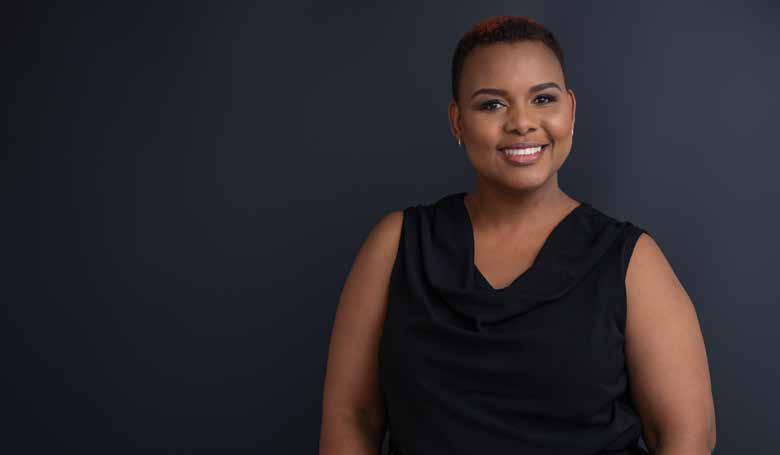
South Africa’s democracy continues to be marred by severe disparities in wealth, health, education, economic opportunities nd access to services. These are all linked to the fulfilment of our human rights.
work, we added mass media and social mobilisation to our interventions that centre the human rights of all people – especially children, women and LGBTQI persons.
Human Rights Day happens in the same month as International Women’s Day, which was commemorated under the “Embrace Equity” theme. However, equity among people and nations remains the greatest challenge of our lifetime. South Africa’s democracy continues to be marred by severe disparities in wealth, health, education, economic opportunities and access to services. These are all linked to the fulfilment of our human rights. We need to ensure that everyone, especially the most marginalised, fully realise their human rights in a just society, where they can live with dignity and self-determination and have the health and wellbeing to grow, flourish and reach their full potential.
We must continue to stand against these systems and strive to create a society where everyone is respected and treated equally. We must challenge the status quo and fight for a world where everyone is free to express themselves without fear of discrimination or oppression. We must create a world where everyone – regardless of race, gender, sexuality, class and nationality – is free to live and thrive without fear of marginalisation or violence.
Our thoughts and actions are shaped by intersecting systems, which are, by nature, violent, disregard the rights of others, instil fear and brainwash the majority to buy into the notion of domination and normalisation of violence and violation. Our social responsibility is to define the gender agenda. Upholding human rights is at the core of this work.
For more information: 011 341 0360 disruptingpatriarchy@soulcity.org.za www.soulcity.org.za

The gender crisis in South Africa remains one of the major unresolved political, developmental and human rights issues of our lifetime.Phinah Kodisang
